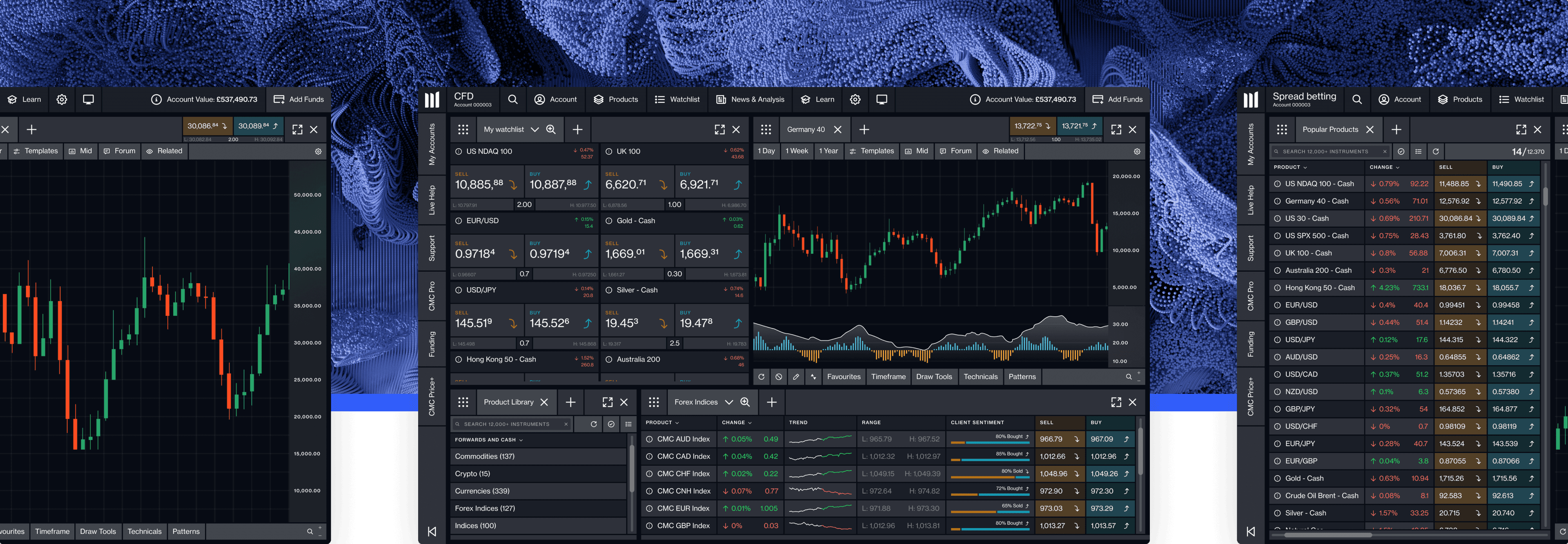How do I trade options with CMC?
You can trade spread bet options, and over-the-counter (OTC) options from a CFD trading account. In this article, we’ll help you become familiar with our web-based trading platform and the steps you need to take to get started.
Learn how to locate options on our platform, and view a list of the available option contracts with the options chain. We also show you how to open an order ticket, and the range of order types you can choose from. Finally, see where you can view your open option positions.
Where can I find options?
Once you’ve opened a CFD trading account with us, head to our trading platform or app and navigate to the ‘Products’ tab. Here you’ll find options, alongside indices, forex, and shares CFDs, and so on, as shown below.
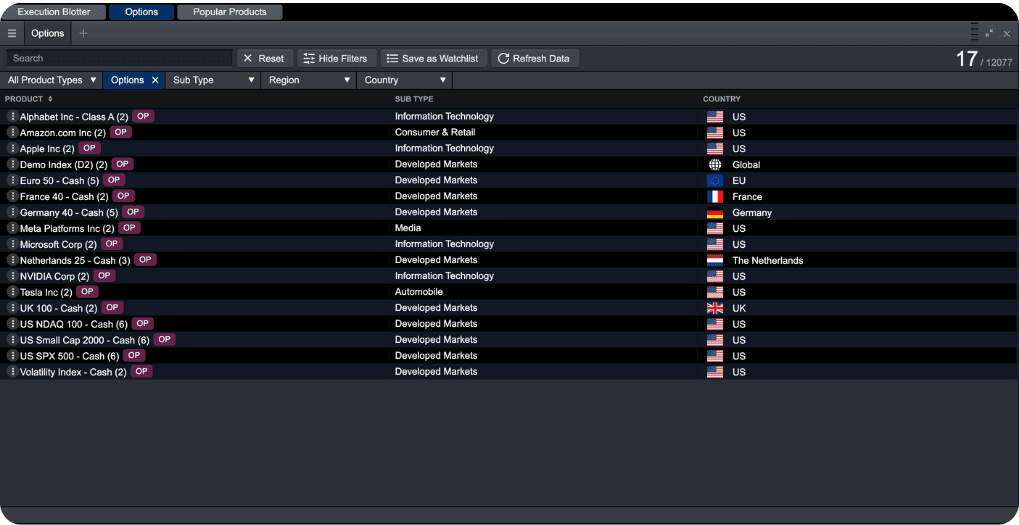
When you select ‘Options’, you’ll open a window containing all the contracts available. Contracts are listed by underlying asset and contract expiry date, as shown below. We offer options based on the following underlying:
What is the options chain?
The options chain (also known as an options matrix) is a list of all the available option contracts for a given underlying security.
To open the options chain, select the options product you’re interested in. A window will open showing you the prices of calls and puts for your chosen underlying asset on a certain expiry date, across a range of strike prices, as in the example below.
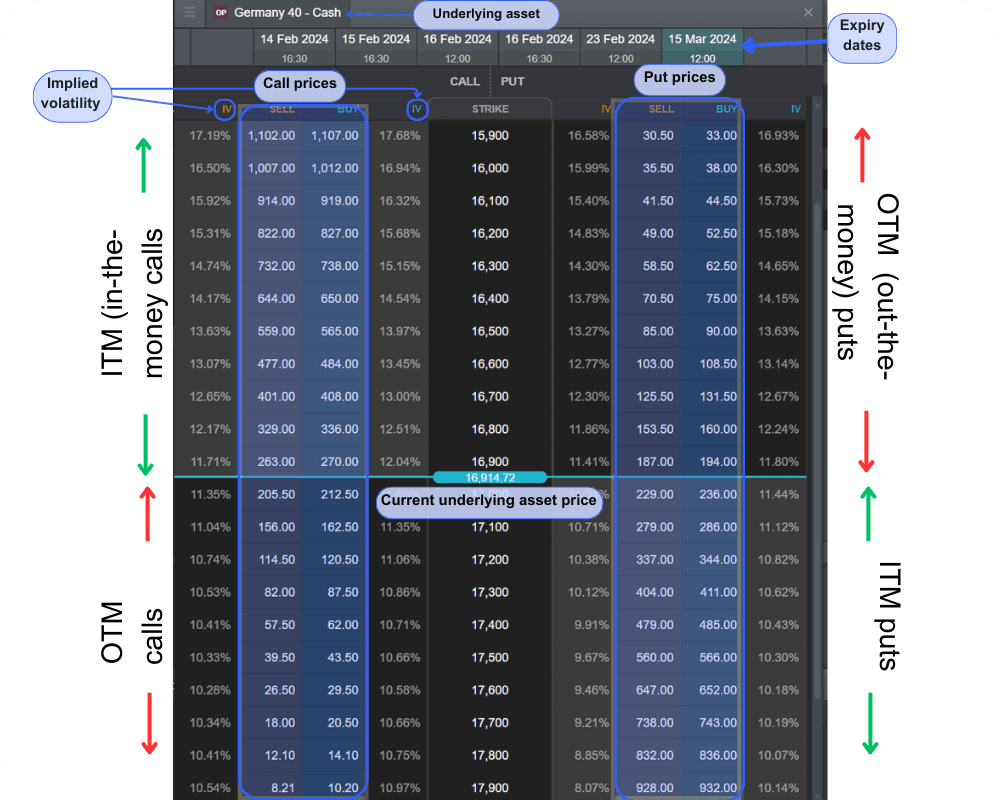
The name of the underlying asset is displayed in the top-left corner of the window – in this example, we’re looking at the Germany 40 - Cash.
The current underlying price is centred on the blue line – in the example above, it’s 16,914.72. As you move down the window, the strike price of the options increases.
In-the-money (ITM) calls and out-of-the-money (OTM) puts can be found above the blue line, whereas OTM calls and ITM puts are below the blue line.
At the top of the window, you can switch between the available expiration dates for this underlying asset. On the left and right side of the window, the ‘IV’ columns indicate the current implied volatility for the contracts.
How do I open an order ticket?
To open an order ticket, choose a price under ‘Buy’ or ‘Sell’ for either a call or put option at the strike of your choice. This will open an order ticket window, like the one shown below.
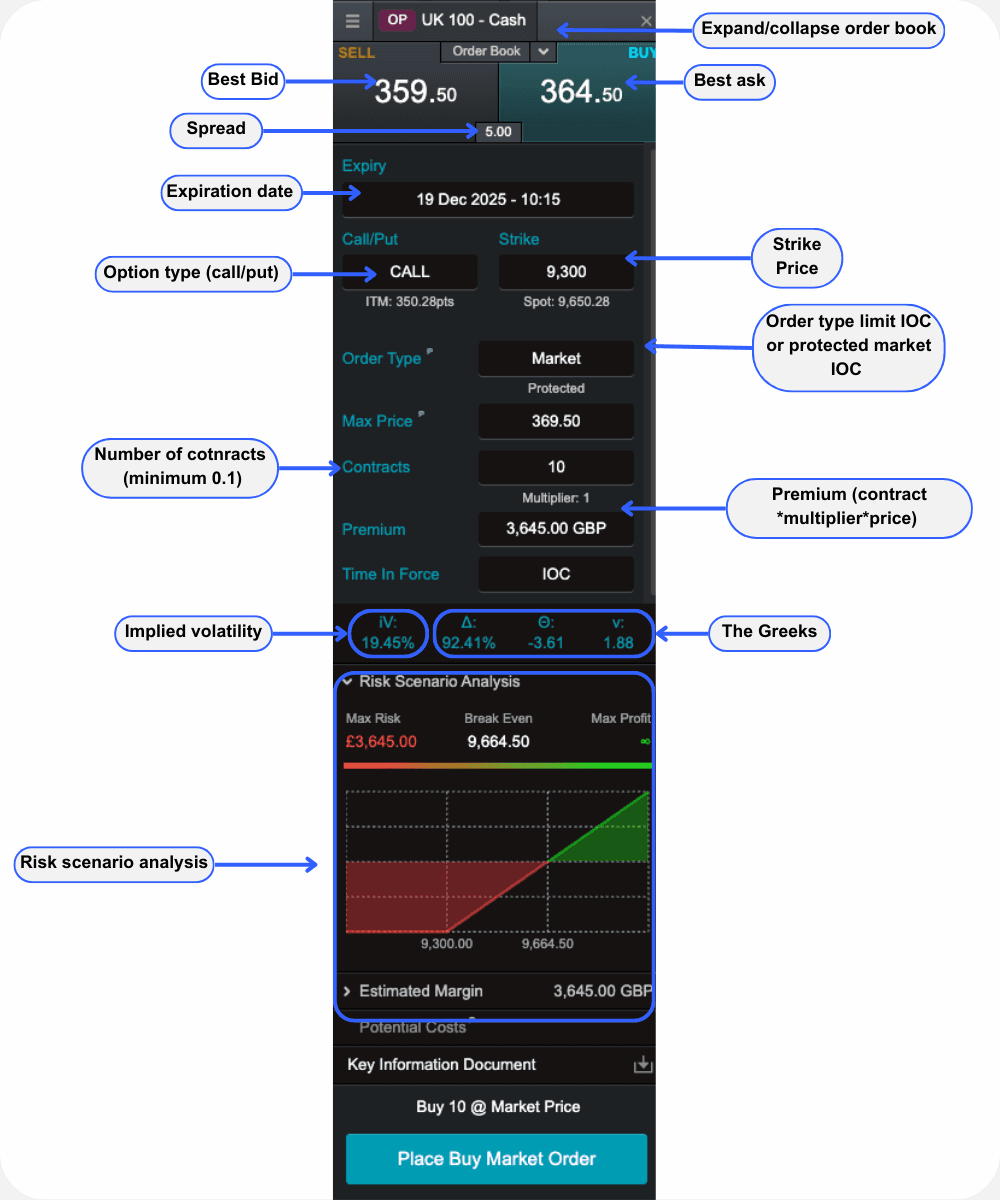
Before placing your order, you need to select your trade size under ‘Contracts’. As we offer fractional options, this number can be as low as 0.01. This corresponds to the number of contracts you are buying or selling. Larger trades require more margin and carry more risks, as profits and losses are magnified by the number of contracts.
There are other settings that you can customise here, too, such as changing the expiry date, order type, option type and strike price. You can also view the estimated margin, potential costs, and the key information document. Plus, you can view information on the Greeks – financial metrics measuring the factors that influence the price of an options contract and give you insights about the risks.
It's important to note that the implied volatility and Greeks on our platform are estimates and are merely indicative. Although we update these readings regularly, we don’t guarantee their accuracy.
You can find more information on the options contract in the product overview, which you can access by selecting the three lines in the top-left of the order ticket and choosing ‘Product Overview’ from the list.
An order for an over-the-counter (OTC) option contract is always ‘immediate or cancel’ (IoC). This means that the order will either be filled immediately (either fully or partially) or cancelled. If a partial fill occurs, then a partial cancellation of the unfilled portion of the order will occur.
Expanding the order book will show how many units are available at each price level.
What order types are available?
There are two types of orders you can place through the platform – limit IOC orders and protected market IOC orders. The latter is shown in the example below.
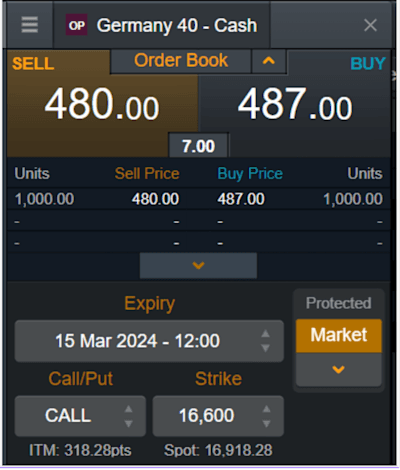
Limit IOC orders: this is a type of limit order that requires immediate execution, either partially or entirely. If the order cannot be filled entirely at either the specified price or a better one, the remaining unfilled portion of the order is automatically cancelled.
Protected market IOC orders: this is a market order with a minimum or maximum price set by us. The purpose is to give protection against slippage. These orders work just like a limit IOC order once the order is submitted, with the upper or lower price as the limit.
As mentioned above, your order may not always be filled at the best buy and sell prices available. To offset this effect, limit orders are a good way to ensure that your order gets placed at a price you’re happy with. When the order book shifts, a limit order can help prevent your trade from getting executed at an unfavourable price, as explained in the example below.
Limit IOC order example
The hypothetical order ticket below shows a sell price of £9.80 and a buy price of £11.20. The expanded order book shows prices at various sell and buy sizes:
Let’s imagine you were to place a limit IOC order to buy 1,000 contracts with a limit price of £19.
Then, just as you place the order, the order book shifts slightly. At the precise moment we receive your order, the order book looks like this:
In this scenario, you would get a fill of 600 contracts bought at an average of £14.98 per contract (100 at £12.90 and 500 at £15.40 (100 * 12.90 + 500 * 15.40/600) = 14.98).
Since you set a limit of £19, the remaining, unfilled portion of your order – 400 contracts – would be cancelled, rather than be executed at the price of £20.10 per unit.
Protected market IOC order example
Now let’s look at a protected market IOC order. The intent of the “protected” aspect of the Order is that it limits the level of slippage that you may be subject to, but this is not guaranteed. As in the previous example, for 100 units the sell price is £9.80 and the buy price is £11.20. The minimum price is £4.80 and the maximum is £18.10. The expanded order book looks as follows:
You place an order to buy 1,000 contracts, but by the time your order is submitted, the order book changes and looks as follows:
The price set by the platform and detailed on the order ticket will be the maximum price at which any portion of the protected market IoC order will be executed. Once the order is submitted and accepted by the platform, it will convert into a limit IoC order with the maximum price as the limit price; here it’s £18.10.
As a result, your order would only be filled with the contracts available under this maximum price, which is 500 contracts at £15.40 and 100 contracts at £12.90. This means you would buy 600 contracts at an average price of £14.98 per contract, and the unfilled portion of 400 contracts would be cancelled.
Where can I view my open positions?
After placing your order, you will receive an order confirmation like the one shown below.
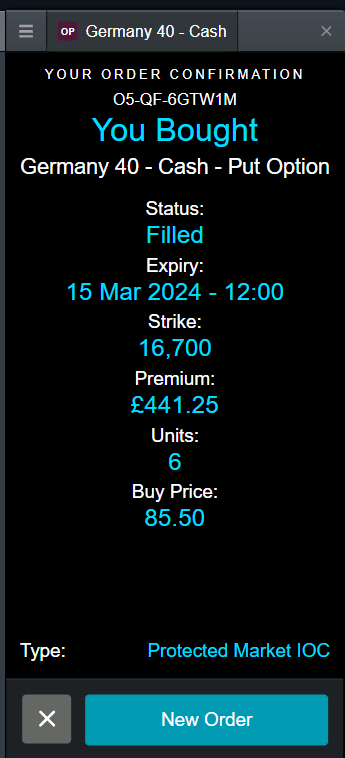
Your open position(s) can then be viewed on the platform under ‘Options Positions’, as shown below. Here, you can monitor the live profit and loss (P&L) of all your open positions. You can close a position by selecting the red cross next to the corresponding position.

A - Expand position to show an order breakdown if you have multiple orders on the same contract
B - Instrument name
C- Expiration date
D - Strike price
E - Long/short position indicator
F - Option type (put/call)
G - Number of contracts
H - The average entry price of your aggregate position for this specific instrument
I - Premium amount
J - Margin of position
K - Total P&L
L - Open an order ticket to sell
M - Open an order ticket to buy
N - Close position
How to start trading options with us
Open a CMC Markets trading account or use your existing CFD account.
Take and pass our options suitability test.
Any questions?
Email us atWe're available whenever the markets are open, from Sunday night through to Friday night.



